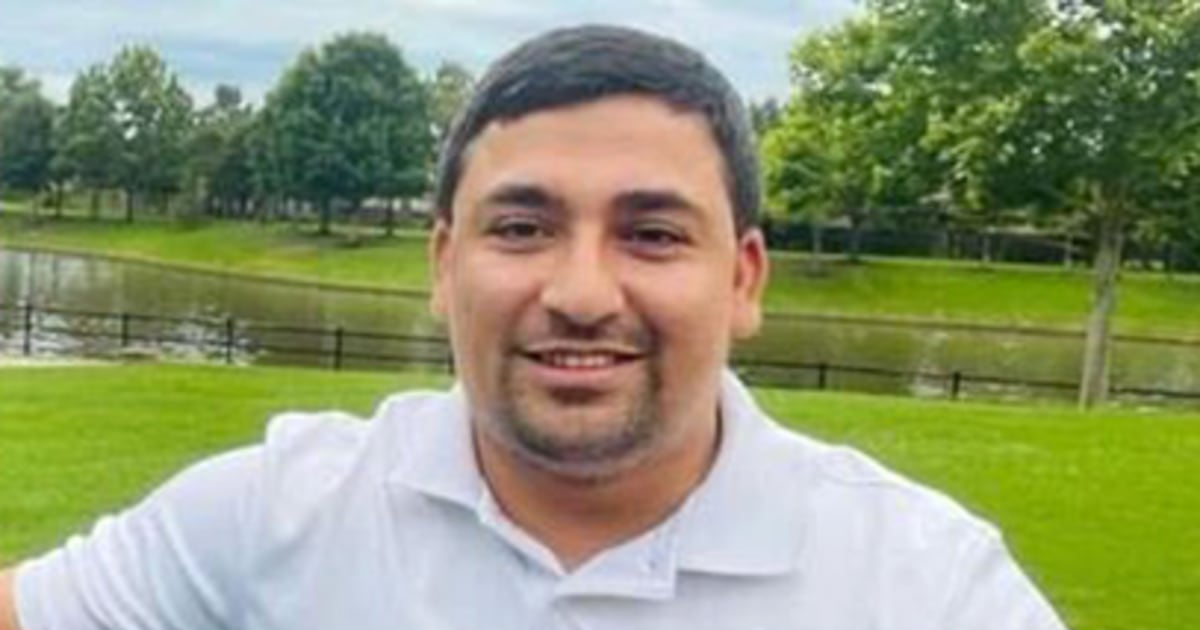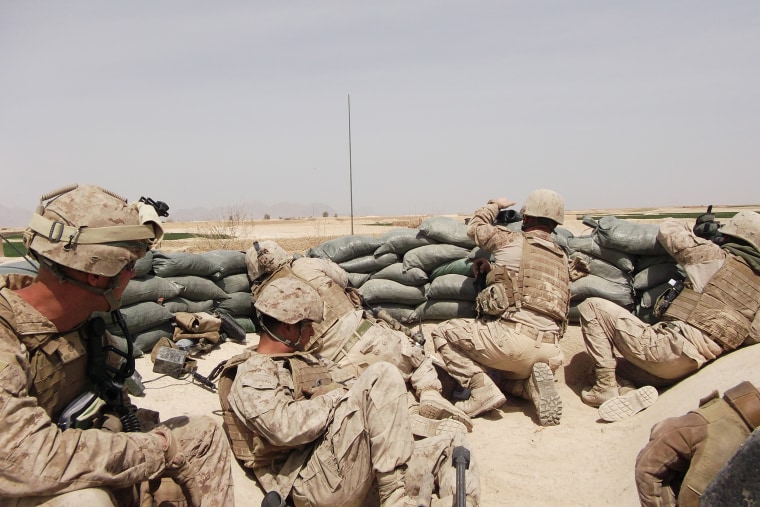
News of Abdul Niazi’s death arrived in a chilling phone call.
It was March 26, nearly the end of Ramadan, and his wife wanted to know when to expect her husband, a former U.S. military interpreter who lost both legs in a bomb blast in Afghanistan and became one of Houston’s most well-known advocates for new Afghan migrants.
It was almost time to break the day’s fast, recalled Niazi’s cousin, but he hadn’t returned home. So she called his cellphone.
“I’m not your husband,” the man on the other end of the line said, according to Rizwanullah Niazi, Niazi’s cousin. “I killed your husband.”
The shock of that call intensified when his family learned what authorities later alleged in bail documents filed in Harris County District Court: An Afghan national who’d sought help from Niazi was accused of stabbing him more than a dozen times over frustration with the slow pace of the U.S. immigration system.
The 34-year-old’s death left the Marines he served with reeling and a hole in Houston’s sizable Afghan community.
“I still don’t believe that he is not with us anymore,” said Nisar Momand, who met Niazi more than a decade ago and, like his friend, helps recently resettled Afghans obtain services and navigate the immigration bureaucracy.
“Abdul was like the backbone of the community,” Momand said. “Without a backbone, we are totally disabled.”
“It’s an unspeakable tragedy,” said Brandon Remington, a former U.S. Marine Corps platoon commander who worked with Niazi in Afghanistan and helped him flee to the United States amid death threats from the Taliban. “Given how much he escaped death and to die in that way — it’s insane. It feels like the universe is crazy.”
Masiullah Sahil, 37, is accused of first-degree murder in Niazi’s death and, until last month, was being held in lieu of $750,000 bond. After prosecutors failed to indict him within three months, as Texas law requires, a judge ordered him released on a personal recognizance bond that required no payment, court records show.
“It just didn’t get done,” a prosecutor said during a July 10 hearing about the failure to obtain that indictment, according to NBC affiliate KPRC of Houston.
Sahil remains jailed, however. The same day Harris County District Court Judge Emily Detoto ordered him released, the district attorney’s office filed a witness tampering charge. He’s being held on $25,000 bond, jail records show. Sahil is scheduled to be arraigned on both charges Aug. 12.
Still, the prosecution’s apparent failure infuriated Niazi’s friends and family, who are calling for an investigation into the district attorney’s office.
“What if he’d gotten out and came and killed his wife and kids?” said Niazi’s close friend Mohammad Bayan, referring to Niazi’s family. “I was completely heartbroken and outraged.”
A spokesperson for the Harris County District Attorney’s Office said the situation is under review with prosecutors assigned to the case. Sahil’s lawyer did not respond to a request for comment.
A fearless interpreter
Niazi was raised in Jalalabad, east of Kabul, and worked as an English teacher before he got a job as a translator with the U.S. Marines in Afghanistan in 2011, said Rizwanullah Niazi, a cousin who also worked as a military translator.
Michael Egan, a Marine who led a unit that Abdul Niazi was attached to for several months in Helmand province, described him as one of the best combat interpreters he worked with — always levelheaded and alert, comfortable in potentially lethal situations and driven by a desire to protect his home.
“He was one of the more courageous and fearless people out there,” said Egan, 36. “You knew if Niazi was with you, you were set.”
That mission ended in May 2012, during what Egan described as a routine foot patrol through a village. Egan stepped on an improvised explosive device and instantly lost both legs.
Minutes later, as Marines desperately tried to stabilize Egan, he said he heard another blast.
Niazi had been ordered to take cover, and when he did, there was a second detonation, said Remington, the former platoon commander, citing an after-action report.

“It was complete and utter chaos,” Egan said.
Niazi was severely wounded. He lost both legs and suffered so much damage to one arm that it would be difficult for him to use a manual wheelchair in the future, Egan said.
A new life in Houston
Niazi underwent months of surgery in India before he returned to Afghanistan, Rizwanullah Niazi said. While there, he started receiving letters from the Taliban threatening his family, said Remington, who by then was attending law school in the United States.
Remington said he helped Niazi apply for a special immigrant visa, designated for people who assisted the U.S. military in Iraq and Afghanistan. Niazi obtained that visa a little over a decade ago and moved to Houston, Remington recalled.
He was one of the thousands of Afghans who worked with the U.S. military and relocated to Texas in the years that followed the U.S. invasion. According to U.S. State Department data, nearly 20,000 Afghans with special visas moved to the state between 2012 and 2023, with a sharp rise after the United States military left the country in 2021.
When Momand first met Niazi at a local clinic in 2014, he wasn’t sure how his countryman would fare in the United States.
“How will he survive in this country with no legs, with a disability and a wheelchair?” he recalled wondering.
Initially, Niazi worked as a sales clerk at a cellphone store, said Bayan, who became best friends with Niazi after he settled in Houston. He eventually had five children — four boys and one girl, the oldest of whom is 10, Bayan said.
He started working for a nonprofit that provided assistance to refugees, Bayan said, and the pair attended college together, earning bachelor’s degrees in business administration from the University of Houston and enrolling in an online master’s program for national security policy at Liberty University in Virginia.
Their goal, Bayan said, was to obtain Ph.D.s and return to Afghanistan to help improve the country’s national security. After the nonprofit Niazi worked for shuttered last year, Bayan said, Niazi established his own business providing services to recent transplants and quickly amassed hundreds of clients.
“Pay me when you can” was Niazi’s business model, Bayan said. When he reminded his friend that he had rent and two assistants to pay, Bayan recalled Niazi responding: “All these refugee families, they’re struggling, and it’s hard for me to ask them for money. Whenever they give it to me, I will accept it.”
An argument and a fatal stabbing
One of those people was Sahil, Bayan said.
Bayan knew Sahil before he went to see Niazi. He said Sahil had sought help from him and others to get the necessary documentation to return to Afghanistan. Bayan said Niazi told him that Sahil kept calling and visiting, wanting to know how to get back to his home country as soon as possible.
But the documentation Sahil needed was “not in my hands,” Bayan recalled Niazi saying.
A client found Niazi dead in his office on March 26. Sahil was seen on video coming and going from the office several times before he was captured leaving with blood on his clothes, according to the bail document.
When authorities found Sahil, he had Niazi’s phone and said that he’d been frustrated with how long it was taking for his refugee status to be approved, according to the document. He admitted to arguing with Niazi, then getting a knife from his car and repeatedly striking him with it.
Niazi’s body was found with 20 deep stab wounds and lacerations, according to the document.
After Niazi’s wife learned of his death through the phone call, Bayan said, the suspect continued calling her. She was screaming and crying, recalled Bayan, who by that point had gone to his friend’s home.
Amid the swirl of grief and confusion, Bayan said he asked for her phone.
Then, he said, he called the man back and asked him about what he had done. After a few vague answers, Bayan said, the man told him Niazi “was not listening to me.”
Immediately after that call, Bayan said, he and a relative of Niazi’s reported what they learned to authorities.
If he could question the suspect again, Bayan said he’d ask him a simple question: “Is it worth taking an innocent life over immigration paperwork?”
Source link

